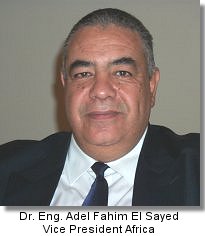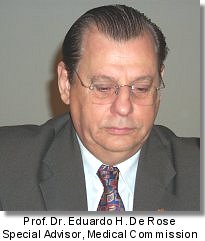
IFBB INTERNATIONAL CONGRESSThe IFBB International Congress is comprised of the members of the IFBB Executive Council and the affiliated National Federations, as represented by their delegates. The Congress meets once each year, on the occasion of the IFBB Men's World Amateur Bodybuilding Championships, to discuss sport-related issues. The Congress provides the forum in which bodybuilding and fitness officials from among our 172 National Affiliates can meet together in the spirit of friendship and cooperation. The IFBB International Congress held it's annual meeting in the Mingalar Hall of the Renaissance Inya Lake Hotel, on Sunday, November 25, 2001, 9:00PM-12:00PM.
The roll call was taken and 46 countries were in attendance. Forty-eight countries participated in the Championships. After opening remarks by Rafael Santonja, IFBB Executive Assistant to the President, welcoming speeches were presented by Colonel Myint Aung, President of the Myanmar Bodybuilding Federation, and Paul Chua, IFBB Vice President for Asia. Mr. Santonja and Ms. Pamela Kagan, IFBB Executive Director, then presented Service Awards to Colonel Myint Aung and U Tin Maung Swe, Vice President-1 of the Myanmar Bodybuilding Federation. The President's Report was read into the record. Rafael Santonja presented a report on the relationship between the IFBB and the IOC, particularly in light of the recent withdrawal of Provisional Recognition. Mr. Santonja assured the Congress that IFBB officials the world over were continuously improving their relationships with IOC officials, as more and more IOC/NOC officials attend bodybuilding events worldwide.
Rafael Santonja stressed the importance of the role that bodybuilding plays in the various Regional Games, such as the South American Games, Central American & Caribbean Games, Pan American Games, African Games, South Pacific Games, Pan Arab Games, Asian Games, Mediterranean Games, and Bolivarian Games. The IFBB currently participates as a medal sport in over 80% of the worldwide Regional Games.
Although Provisional Recognition is normally set to lapse after a two-year period, the IFBB recognition was allowed to continue for almost 4 years. The election of a new IOC President and new IOC Executive Board hindered our chances at achieving full recognition at this time. The IFBB contends that it met all of its obligations under Rule 29 of the Olympic Charter and that the decision to withdraw recognition was "subjective" and not "objective". The IFBB will continue to seek full recognition from the IOC. The area Vice Presidents reported that the sports of bodybuilding and fitness were continuing to grow at a phenomenal rate within their jurisdictions. In addition, the numbers of positives were steadily declining as a result of the new "get tough" policy implemented by President Weider. Brief reports were presented by Paul Chua, IFBB Vice President for Asia, Paul Graham, IFBB Vice President for Oceania, Javier Pollock, IFBB Vice President for Central America & the Caribbean, Dr. Eng. Adel Fahim El Sayed, IFBB Vice President for Africa, and Malih Alaywan, IFBB Vice President for the Middle East. Paul Chua advised the Congress that Mr. Kim Nam Hak (Korea) had resigned his position as President of the Asian BodyBuilding Federation and that Mr. Mergaliyev Bulat (Kazahkstan) had been elected as the new President.
Dr. Eng. Adel Fahim El Sayed outlined the success of the Five-Continents Championships that were organized in Egypt. Fifteen countries participated. Prof. Dr. Eduardo H. De Rose, Special Advisor to the IFBB Medical Commmission, Dr. Bob Goldman, Chairman of the IFBB Medical Commission, and Prof. Dr. Friedhelm Beuker, Secretary of the IFBB Medical Commission, presented brief reports on their activities over the past year. These reports centered on the topic of increasing doping control education through seminars and lectures, and decreasing positives through effective anti-doping programs. Prof. Dr. De Rose strongly recommended that the IFBB investigate the implementation of a more effective out-of-competition program and blood testing. Tony Blinn, Chairman of the IFBB Technical Committee, reported on the amendments to important IFBB documents, such as the Constitution, Amateur Bodybuilding & Fitness Rules, and Anti-Doping Program. Mr. Blinn also discussed the increasing role that IFBB.com plays in the development of the sport worldwide. Lisser Frost-Larsen, Chairwoman of the IFBB Women's Committee, expressed her concern over the direction in which women's fitness was headed and wished to see a new category of judges, exclusive to women's fitness. The IFBB accepted this recommendation and will be introducing separate international judging cards for fitness judges only.
Ms. Pamela Kagan, IFBB Executive Director, presented a brief report on the day-to-day problems associated with managing 172 National Federations and asked for the cooperation of all IFBB/NF officials in making this task easier. Paul Chua, IFBB Vice President for Asia, presented a brief report on the recent GAISF/IWGA annual general meetings that he had attended, which were held in Singapore in October. The floor was turned over to the National Federations, who raised the following issues:
Propositions from the National Federations:The first proposition, from Poland, concerned the implementation of "bodyweight vs bodyheight" limits. Although this proposition was tabled for further research, it was noted that it was a good idea for beginners to our sport. The second proposition, from Poland, concerned the implementation of a "separate posing round during the Prejudging". This proposition was rejected. The third proposition, from Poland, concerned women's bodybuilding and was subdivided as follows: - That greater restrictions be placed on muscle size. Currently, this issue is satisfactorily covered in the IFBB Rules. - That the posing at the Finals be judged as a separate round. This led to the decision, on a trial basis at these Championships only, to disallow the use of the "Judges Personal Notes" form during the Finals. - That the posing routines be similar to the fitness routines except for acrobatic movements. This issue was tabled for further review.
The fourth proposition, from Slovakia, concerned the re-establishment of the Mixed-Pairs category at the World level. This proposition was rejected. The fifth proposition, from Slovakia, concerned amendments to the men's bodyweight categories. This led to the decision to record the competitor's bodyweight at these Championships and to conduct further research into this issue. The sixth proposition, from Slovakia, concerned an amendment to the Rules to allow each National Federation to send up to a maximum of four fitness competitors to the World Championships. This proposition was rejected.
IFBB Executive Council Decisions:
Ms. Pamela Kagan, IFBB Executive Director, discussed the 2002 IFBB Professional Calendar and 2002 IFBB Amateur Calendar. There being no further business, the Chairman thanked all delegates for their attendance and adjourned the meeting at 12:00PM.
|







